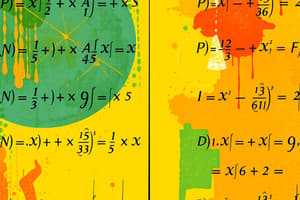Podcast
Questions and Answers
Which of the following is not a quadratic equation?
Which of the following is not a quadratic equation?
- 5x = 0 (correct)
- 2x^2 + 9 = 0
- x^2 - 2x = 0
- 3x^2 - 5 = 0
In the quadratic equation 8x^2 + 14x - 17 = 0, identify the coefficient of x.
In the quadratic equation 8x^2 + 14x - 17 = 0, identify the coefficient of x.
- 14 (correct)
- 8
- 0
- -17
Which of the following forms represents a complete quadratic equation?
Which of the following forms represents a complete quadratic equation?
- 4x^2 - 8 = 0
- x^2 - 4 = 0
- x^2 - 4x + 1 = 0 (correct)
- 2x^2 + 9 = 0
Which equation fits the standard form of a quadratic equation?
Which equation fits the standard form of a quadratic equation?
What is the main characteristic of the constant term in a quadratic equation?
What is the main characteristic of the constant term in a quadratic equation?
When transforming the equation 3x^2 = 7x + 3, what is the equivalent standard form?
When transforming the equation 3x^2 = 7x + 3, what is the equivalent standard form?
Which of the following equations is an example of an incomplete quadratic equation?
Which of the following equations is an example of an incomplete quadratic equation?
Determine the values of a, b, and c in the equation 4x^2 + x - 2 = 0.
Determine the values of a, b, and c in the equation 4x^2 + x - 2 = 0.
Flashcards are hidden until you start studying
Study Notes
Quadratic Equations
- A quadratic equation is a mathematical expression of degree 2, represented as ( ax^2 + bx + c = 0 ).
- Variables ( a ), ( b ), and ( c ) are real numbers and ( a ) must be non-zero.
- The term ( ax^2 ) is the quadratic term, ( bx ) is the linear term, and ( c ) is the constant term.
Types of Quadratic Equations
-
Complete Quadratic Equations: Include all three terms ( ax^2, bx, c ).
- Examples:
- ( x^2 - 4x + 1 = 0 )
- ( 3x^2 + 2x - 1 = 0 )
- Examples:
-
Incomplete Quadratic Equations: Missing one or more terms.
- Examples:
- ( 2x^2 + 9 = 0 )
- ( 4x^2 - 8 = 0 )
- ( x^2 - 9x = 0 )
- Examples:
Identifying Quadratic Equations
-
Criteria for quadratic equations include having a variable raised to the second power.
-
Examples of quadratic equations:
- ( 3x^2 - 5 = 0 )
- ( x^2 - 2x = 0 )
- ( 2x^2 - 5x + 1 = 0 )
-
Non-quadratic examples include linear equations:
- ( 5x = 0 )
- ( \frac{1}{2}x - 3 = 0 )
Transforming to Standard Form
- Standard form requires rearranging equations to ( ax^2 + bx + c = 0 ).
- Example transformations must identify values of ( a ), ( b ), and ( c ):
- For ( 8x^2 + 14x - 17 = 0 ):
- ( a = 8 ), ( b = 14 ), ( c = -17 )
- For ( 8x^2 + 14x - 17 = 0 ):
Practice Transformations
- Transform and identify coefficients for various forms:
- From ( 3x^2 = 7x + 3 ) to standard form.
- From ( 2x(x - 1) = 7 ) to standard form.
- Identify values for each transformed equation.
Additional Equations for Transformation Practice
- Examples include various formats requiring rearrangement to standard form:
- ( x + 5 = 0 )
- ( 4x^2 + x = (x - 1)^2 )
- Analyze combinations in factored form such as ( (2x + 5)(x + 1) = 8 ).
Conclusion
- Mastery of identifying and transforming quadratic equations is essential for understanding their properties and solutions.
Studying That Suits You
Use AI to generate personalized quizzes and flashcards to suit your learning preferences.




